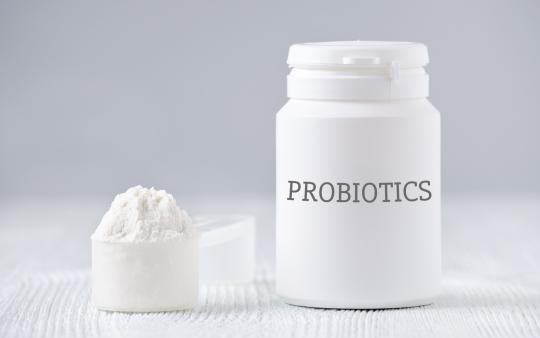About 40,000 species of bacteria, 5 million species of fungi, and 300,000 species of parasites work together in our body’s microbiome, exerting influence over things like our metabolism, weight, digestion, immune function, hormones, mood, and behaviour. As we begin to learn more about our microbiome’s importance, we have also begun the search for products and supplements to best support it. Probiotics have moved to the forefront as a defender, healer, and booster of the microbiome, and while it can be tempting to view supplementation as a panacea, the research on the efficacy and safety of probiotic supplements as a tool to support health continues to evolve. While, overall, probiotics have been deemed safe, whether or not they work for certain conditions and to what extent is still not fully understood. Here are the highlights:
Allergies and asthma
Several studies in both allergy reduction and asthma relief have demonstrated that giving probiotic supplements to babies can reduce the risk of allergies later in life and may improve symptoms in asthma. However, a review on allergy benefits in 2015 revealed that a significant body of work also exists showing little effect, likewise some asthma studies have also shown similarly negative results.
ADHD, autism, and mood disorders
Many studies have linked ADHD, autism, and mood disorders with the microbiome, and have suggested that probiotics may help improve symptoms. This includes a small 2015 study which theorized that Lactobacillus rhamnosus given in childhood might reduce the risk of ADHD and ASD.
Antibiotic recovery
As mentioned above, post-infection complications like diarrhea can be reduced with probiotic therapy. Interestingly, a 2018 study countered this, noting in their findings that the post-antibiotic subjects who were slowest to recover were those given a probiotic supplement. This new study demonstrates the need for deeper understanding of the body’s natural healing ability and how probiotics can best serve it.
Improving eczema
The strains, Lactobacillus GG, Bifidobacterium lactis, Lactobacillus rhamnosus, and L reuteri, have shown to be effective for reducing the severity of eczema in children.
Digestive complaints
According to the American College of Gastroenterology, probiotics can improve the pain and discomfort of IBS. Bifidobacteria breve, infantis, and longum have also been found to help resolve constipation in children, symptoms of diarrhea have been shown to improve using S Boulardii, and a 2015 review of 23 studies concluded that probiotics can safely be used to help prevent C. difficile infection post-antibiotic.
Oral health
Lactobacillus, Bifidobacterium, and Streptococcus strains have been shown to help prevent cavities by reducing harmful bacteria in the mouth.
Should you take probiotic supplements?
Our understanding of how microbes work synergistically with each other and with their host is deepening, and the complexity of these interactions is likely why study results have been inconsistent. Current research is still generally supporting probiotic bacteria as a safe way to support the microbiome in pregnant women, babies, and young children. You might consider a probiotic when your child is exposed to stress, sugar, chemicals, is travelling, or if digestive or immune functions seem out of balance, but keep in mind a probiotic is not a cure-all. And before giving any supplements to your child talk with your health care team.
Simple steps for microbiome support
Reduce exposure
...to negative influencers of the microflora like chemicals, sugar, artificial sweeteners, and stress.
Encourage more microbes and introduce new ones
...by increasing intake of fermented foods and by spending time outdoors in nature.
Improve digestive efficiency
...by eating mindfully, slower chewing, and taking adequate time to digest.
Nourish the gut mucosa and microbes
...by including foods like bone broth, onion, garlic, and asparagus.
When it comes to research on the microbiome, one thing stands out—when we focus on improving digestive health, our kids’ resilience increases. Probiotic supplements can be a tool to help support the microbiome, but they are not the end of the story; rather they are only part of a bigger picture of digestive health.
References
Cuello-Garcia, Carlos, A. Probiotics for the prevention of allergy: A systematic review and meta-analysis of randomized controlled trials Journal of Allergy and Clinical Immunology, Volume 136, Issue 4, October 2015, Pages 952-961
Zuccotti, G. et al. Probiotics for prevention of atopic diseases in infants: systematic review and meta‐analysis. Euro J of Allergy and Clinical Immunology. (July 2015) https://onlinelibrary.wiley.com/doi/full/10.1111/all.12700
Tabbers MM, de Milliano I, Roseboom MG, Benninga MA. Is Bifidobacterium breve effective in the treatment of childhood constipation? Results from a pilot study. Nutr J. 2011 Feb 23;10:19.
Alexander, C Ford. Efficacy of Prebiotics, Probiotics, and Synbiotics in Irritable Bowel Syndrome and Chronic Idiopathic Constipation: Systematic Review and Meta-analysis. The American Journal of Gastroenterology volume 109, pages 1547–1561 (2014) https://www.nature.com/articles/ajg2014202
Allen SJ et al. Probiotics in the prevention of eczema: a randomized controlled trial Archives of Disease in Childhood 2014 Jun 19; doi:10.1136/archdischild-2013-305799
Allen, J Stephen et al. Dietary Supplementation with Lactobacilli and Bifidobacteria Is Well Tolerated and Not Associated with Adverse Events during Late Pregnancy and Early Infancy. Journal of Nutrition 140(3):483-8 • March 2010
Didari T, Solki S, Mozaffari S, et al. A systematic review of the safety of probiotics. Expert Opinion on Drug Safety. 2014;13(2):227–239.
Ford AC, Moayyedi P, Lacy BE, et al. American College of Gastroenterology monograph on the management of irritable bowel syndrome and chronic idiopathic constipation. American Journal of Gastroenterology. 2014;109:S2–S26.
Goldenberg JZ, Ma SS, Saxton JD, et al. Probiotics for the prevention of Clostridium difficile-associated diarrhea in adults and children. Cochrane Database of Systematic Reviews. 2013;(5):CD006095. Accessed at www.thecochranelibrary.com on April 24, 2015.
Hempel S, Newberry SJ, Maher AR, et al. Probiotics for the prevention and treatment of antibiotic-associated diarrhea: a systematic review and meta-analysis. JAMA. 2012;307(18):1959–1969.
Moayyedi P, Ford AC, Talley NJ, et al. The efficacy of probiotics in the treatment of irritable bowel syndrome: a systematic review. Gut. 2010;59(3):325–332.
Kelesidis, Theodoros. Efficacy and safety of the probiotic Saccharomyces boulardii for the prevention and therapy of gastrointestinal disorders. Therap Adv Gastroenterol. 2012 Mar; 5(2): 111–125 https://www.ncbi.nlm.nih.gov/pmc/articles/PMC3296087/
Sanders ME, Akkermans LMA, Haller D, et al. Safety assessment of probiotics for human use. Gut Microbes. 2010;1(3):164–185.
Allen SJ, Martinez EG, Gregorio GV, et al. Probiotics for treating acute infectious diarrhoea. Cochrane Database of Systematic Reviews. 2010;(11):CD003048. Accessed at www.thecochranelibrary.com on April 24, 2015.
Bizzini B, Pizzo G, Scapagnini G, et al. Probiotics and oral health. Current Pharmaceutical Design. 2012;18(34):5522–5531.
Pärtty, Anna et al, A possible link between early probiotic intervention and the risk of neuropsychiatric disorders later in childhood: a randomized trial. Pediatric Research volume 77, pages 823–828 (March 2015)
Hao Q, Lu Z, Dong BR, et al. Probiotics for preventing acute upper respiratory tract infections. Cochrane Database of Systematic Reviews. 2015;(2):CD006895. Accessed at www.thecochranelibrary.com on April 24, 2015.
Hungin AP, Mulligan C, Pot B, et al. Systematic review: probiotics in the management of lower gastrointestinal symptoms in clinical practice—an evidence-based international guide. Alimentary Pharmacology and Therapeutics. 2013;38(8):864–886.
Indrio F, Di Mauro A, Riezzo G, et al. Prophylactic use of a probiotic in the prevention of colic, pregurgitation, and functional constipation: a randomized clinical trial. JAMA Pediatrics. 2014;168(3):228–233.
Kelesidis T, Pothoulakis C. Efficacy and safety of the probiotic Saccharomyces boulardii for the prevention and therapy of gastrointestinal disorders. Therapeutic Advances in Gastroenterology. 2012;5(2):111–125.
McFarland LV. Use of probiotics to correct dysbiosis of normal microbiota following disease or disruptive events: a systematic review. BMJ Open. 2014;4:e005047.
Pattani R, Palda VA, Hwang SW, et al. Probiotics for the prevention of antibiotic-associated diarrhea and Clostridium difficile infection among hospitalized patients: systematic review and meta-analysis. Open Medicine. 2013;7(2):e57.
Shanahan F. A commentary on the safety of probiotics. Gastroenterology Clinics of North America. 2012;41(4):869–876.
Dario Siniscalco,et al Inflammation and Neuro-Immune Dysregulations in Autism Spectrum Disorders. Pharmaceuticals (Basel). 2018 Jun; 11(2): 56. https://www.ncbi.nlm.nih.gov/pmc/articles/PMC6027314/
Mangiola, Francesca et al. Gut microbiota in autism and mood disorders World J Gastroenterol. 2016 Jan 7; 22(1): 361–368. https://www.ncbi.nlm.nih.gov/pmc/articles/PMC4698498/
Xiaoming Bian et al Gut Microbiome Response to Sucralose and Its Potential Role in Inducing Liver Inflammation in Mice. Front Physiol. 2017; 8: 487.
Artificial sweeteners and microbes: https://www.scientificamerican.com/article/artificial-sweeteners-may-change-our-gut-bacteria-in-dangerous-ways/






